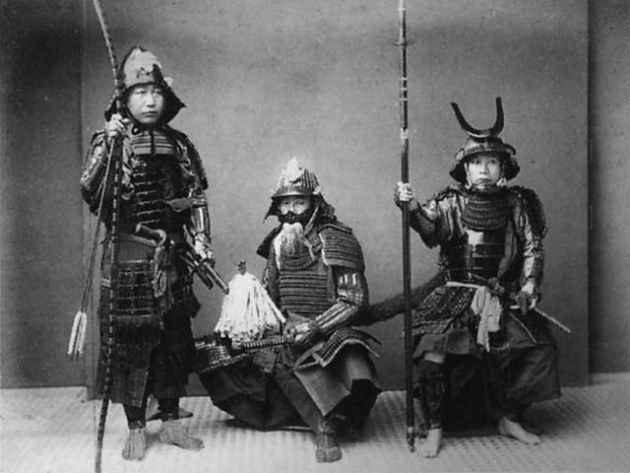Ethical teachings such as the virtues of the Buddhist Eightfold Path and the precepts of Bushido can help inspire us to live a noble life.
“Bu-Shi-Do translates as Military-Knight-Ways, the ways which fighting nobles should observe in their daily lives as well as in there vocation. In short, Precepts of Knighthood.”
“Bushido is a lesson on living a noble life. The Bushido or Code of Conduct contains eternal values that men recognize universally. Bushido is suggestive of things that men strive for and which move them to their finest actions. Its realization calls for sacrifice and active living. A code that is unwritten and unuttered.”
-Nitobe Inazo, Bushido
Benevolence
A man invested with the power to command and the power to kill was expected to demonstrate equally extraordinary powers of benevolence and mercy.
Love, magnanimity, affection for others, sympathy and pity, are traits of Benevolence, the highest attribute of the human soul. Both Confucius and Mencius often said the highest requirement of a ruler of men is Benevolence. Nietzsche wrote, “You are to be proud of your enemy; then the success of your enemy is your success also.”
Self Control/Character
The first objective of samurai education was to build up Character. The subtler faculties of prudence, intelligence, and dialectics were less important. Intellectual superiority was esteemed, but a samurai was essentially a man of action.
No historian would argue that Hideyoshi (14th century warrior and general) personified the Eight Virtues of Bushido throughout his life. Like many great men, deep faults paralleled his towering gifts. Yet by choosing compassion over confrontation, and benevolence over belligerence, he demonstrated ageless qualities of manliness. Today his lessons could not be more timely.
Politeness
Politeness is about making space for the good to express in other people, to allow the Essence of others to shine by offering a civil, harmonious, non-judgmental interaction, rooted in love and regard of this person’s humanity.
For a true man, politeness is rooted in benevolence. Politeness should be the expression of a benevolent regard for the feelings of others; it’s a poor virtue if it’s motivated only by a fear of offending good taste. In its highest form Politeness approaches love.
Sincerity
True samurai, according to author Nitobe, disdained money, believing that “men must grudge money, for riches hinder wisdom.”
Thus children of high-ranking samurai were raised to believe that talking about money showed poor taste, and that ignorance of the value of different coins showed good breeding: Bushido encouraged thrift, not for economical reasons so much as for the exercise of abstinence. Luxury was thought the greatest menace to manhood, and severe simplicity was required of the warrior class … the counting machine and abacus were abhorred.
Rectitude
Rectitude is the power of deciding upon a certain course of conduct in accordance with reason, without wavering- to die when it is right to die, to strike when it is right to strike. Rectitude is the bone that gives firmness and stature. Without bones the head cannot rest on top of the spine, nor hands move nor feet stand. So without Rectitude neither talent nor learning can make the human frame into a samurai.
Honor
Though Bushido deals with the profession of soldiering, it is equally concerned with non-martial behavior.
The sense of Honor, a vivid consciousness of personal dignity and worth, characterized the samurai. He was born and bred to value the duties and privileges of his profession. Fear of disgrace hung like a sword over the head of every samurai … To take offense at slight provocation was ridiculed as ‘short-tempered.’ As the popular adage put it: ‘True patience means bearing the unbearable.’
Loyalty and Obedience to our Inner Master
Loyalty to one’s lord was the supreme goal for the Samurai. To never forget his master and to put his master first was the most fundamental
priority.
“A man is a good Samurai to the extent that he earnestly places importance on his master” -Yamamoto Tsunetomo
Every morning one should first do reverence to his master, for a warrior there is nothing other than thinking of his master. Not to forget ones master is the most fundamental thing for a retainer (Samurai). A person who serves when treated kindly by his master is not a retainer. But one who serves when the master is being heartless and unreasonable, is a retainer.
Courage
Courage is not blindly going into battle, but having awareness and consciousness to do whatever is necessary in the moment. Sometimes it is fighting and standing up for what is right, sometimes it is composing a poem, sometimes it is letting an enemy go so as to not put them to shame.
Who can compose a poem under impending peril, or hum a strain in the face of death. Ota Dokan, the great builder of the castle of Tokyo, was pierced through with a spear and his assassin accompanied his thrust with this couplet:
“Ah! How in moments like these
Our heart doth grudge the light of life.”
Whereupon the expiring hero, not one whit daunted by the mortal wound in his side, added the lines:
“Had it not in hours of peace,
Learned to look lightly on life.”
Quotes from Nitobe Inazo, Bushido

